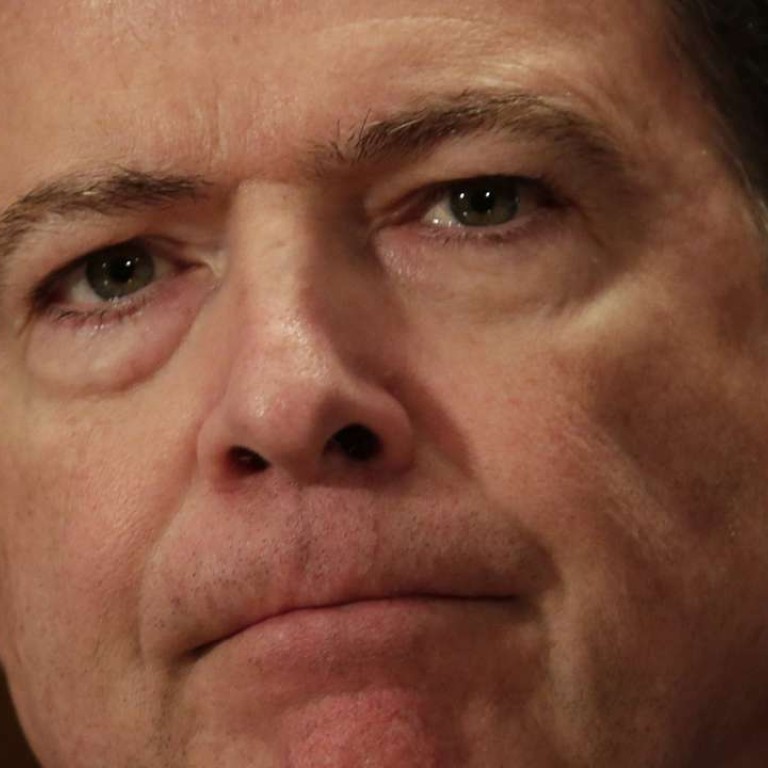
New | White House: FBI chief not trying to tip raucous Clinton-Trump battle for US president
Both candidates scramble as bitter US campaign enters last week
As Hillary Clinton’s allies went on the attack against FBI Director James Comey, the White House defended the FBI chief against allegations from some Democrats that he’s trying to interfere with the election.
President Barack Obama’s spokesman, Josh Earnest, said Monday that he doesn’t believe Comey is “secretly strategising to benefit one candidate or one political party” by disclosing a review of newly discovered e-mails that might be related to the investigation of the former secretary of state’s use of a private server. “He’s in a tough spot.”
But Earnest also said that Obama believes in the principle and tradition of limiting public discussion about FBI investigations that might affect the political process.
“I’ll neither defend nor criticise what Director Comey has decided to communicate to the public about this investigation,” Earnest said at the regular White House briefing. “The president believes that it’s important for those norms and traditions and guidelines to be followed.”
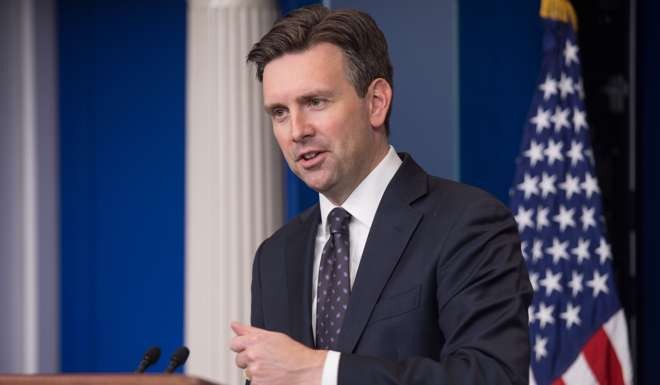
Democrats, who are mounting an effort to contain the political damage to Clinton just nine days before the election, are starting to openly worry that the outcome could be affected by Comey’s disclosure. Clinton’s allies have questioned Comey’s motives.
Elijah Cummings, the top Democrat on the House Oversight Committee, said Monday that Comey has not been similarly forthcoming about whether the bureau is investigating Trump associates and former campaign aides for purported links to Russia, as several media outlets have reported.
“I do not know how Director Comey will justify his decision to withhold information relating to Trump while publicly announcing ongoing investigative steps against his opponent just days before the election,” Cummings said.
Separately, Harry Reid, the Senate’s top Democrat, delivered an unusual rebuke to the FBI chief in a letter Sunday that said Comey may have broken the law by revealing the review so close to the election, and suggested the agency is sitting on potentially damaging information about Republican presidential nominee Donald Trump.
Reid’s scorching letter -- typical of the combative Nevadan’s style -- was one of the most confrontational messages delivered by Clinton supporters, who took to talk shows, newspaper opinion pages and social media to question the propriety of Comey’s disclosure.
Late Sunday, one Democratic member of the House Judiciary Committee, Steve Cohen of Tennessee, called for Comey’s resignation. Judiciary is among the congressional committees that oversee the FBI, and Cohen is the top Democrat on a subcommittee with jurisdiction over matters involving ethics in government.
Cohen said Comey’s disclosure was indefensible. “He should have known, anyone would have known and the Justice Department knew, that would have produced a scandalous result and be harmful to the American process of elections,“ Cohen said Monday on CNN. ”He went too far.“
Asked whether the episode could cost Clinton the election, he said: “I think it could, yes.”
The new probe led to a weekend of scrambling by both Clinton and Trump and put the US presidential race into uncharted territory. The two campaigns responded by falling back on the familiar. After hitting back at Comey on Friday and Saturday, Clinton moved on by Sunday to reiterating her campaign’s themes, leaving the attacks on the FBI director to her proxies.
Trump reinvigorated his assault on Clinton’s trustworthiness and found a new cue for his crowds to chant “lock her up” as he ramped up his campaign pace.
Millions of Americans are already casting ballots for an election that concludes eight days from now, and polls show the race had already tightened. Clinton looked to the FBI review as a way to rally her Democratic base while Trump sought to sway undecided voters and Republicans who’ve been reluctant to back him.
Clinton didn’t mention the investigation directly while campaigning in the battleground state of Florida on Sunday. Rather, she continued to attack Trump as unfit and unqualified to be president, combining a push for supporters to vote early.
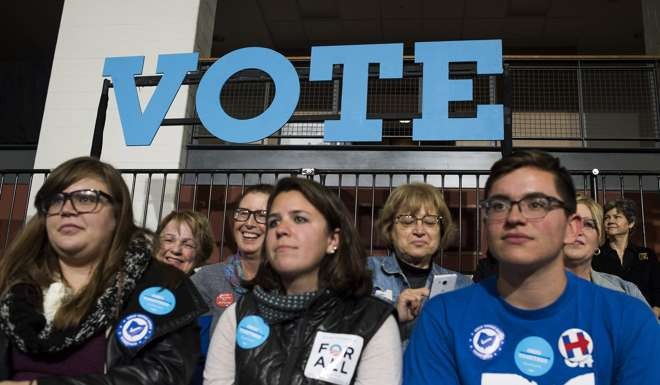
Still, in a veiled reference to events of recent days, she told her audience not to let “all the noise in the political environment’’ distract from the important issues that will be decided on election day.
“No matter what is thrown our way, we are not going to back down, we are not going to give up, we’re going to reject anyone who tries to drag us backwards,” Clinton said in remarks at New Mount Olive Baptist Church in Fort Lauderdale.
Her campaign on Monday released a TV ad featuring the woman who, as a girl in 1964, starred in Lyndon B. Johnson’s famous “Daisy” ad warning of putting nuclear weapons in the hands of a volatile leader. The spot will air during the nightly news in eight battleground states, the campaign said.
Clinton retained a 3 percentage point lead in a Politico/Morning Consult poll taken after Comey’s disclosure.
Undecided voters were split about evenly on whether the e-mail developments made them less likely to vote for Clinton or wouldn’t affect their decision, according to Politico. A CBS poll of battleground states indicated Clinton was at least holding together her base coalition, while Clinton’s edge over Trump in the ABC/Washington Post tracking poll had shrunk to 1 point, down from 12 points a week ago.
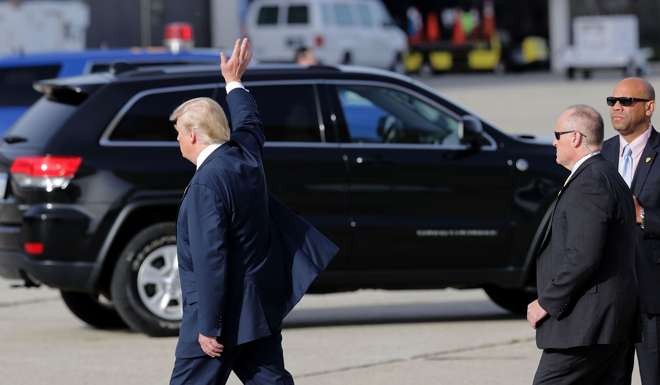
For Trump, Comey’s revelation served as a reset for a campaign that had been beset by the candidate’s own stumbles, his lewd comments from 2005 that were captured on videotape and came to light this month, and falling poll numbers.
A Trump adviser, who discussed strategy on condition of anonymity, said the Republican will try to let the e-mail story consume Clinton in the final days of the campaign and avoid statements or gaffes that will make him the centre of any story.
His aides, who are getting regular updates on the FBI probe from allies on Capitol Hill, are urging Trump to simply “be presidential” as they look to capitalise on an unexpected chance to get a second look from independent and undecided voters.
“Haven’t we had enough drama with the Clintons?” Trump asked the crowd at a rally in Phoenix on Saturday.
The candidates are stuffing their schedules in battleground states between now and November 8. Trump is increasing the number of rallies he holds to four or five a day. Clinton is hitting the major swing states she needs to block Trump, including Ohio and Florida, and is trying to expand her campaign into Arizona, which has been a Republican stronghold in presidential elections. Arizona voters last backed a Democrat in 1996: Clinton’s husband, Bill.
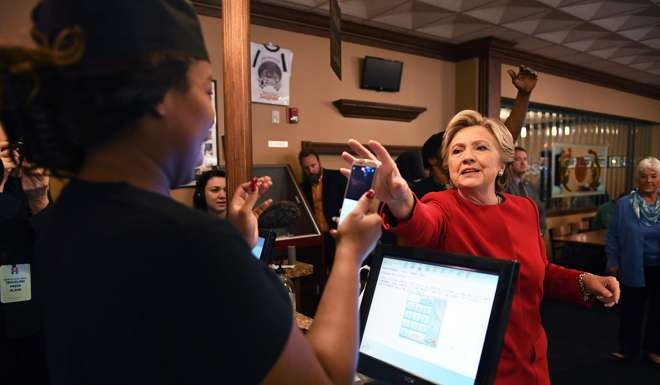
But both of their closing campaign messages were overshadowed, at least temporarily, by Comey’s revelation of the e-mail review and the questions raised about it by members of both parties in Washington. The e-mails were discovered on a computer belonging to Anthony Weiner, the estranged husband of close Clinton aide Huma Abedin, during an unrelated investigation of the former congressman.
The FBI on Sunday obtained a new warrant to review the material on Weiner’s computer, which will allow it to determine if any e-mails belonging to Abedin were unknown to the team investigating Clinton and whether they contain classified information, according to a person familiar with the matter.
As that process played out, Clinton’s allies piled on Comey.
In his letter, Reid accused Comey of a “disturbing double standard” that appears to be “a clear intent to aid one political party over another.”
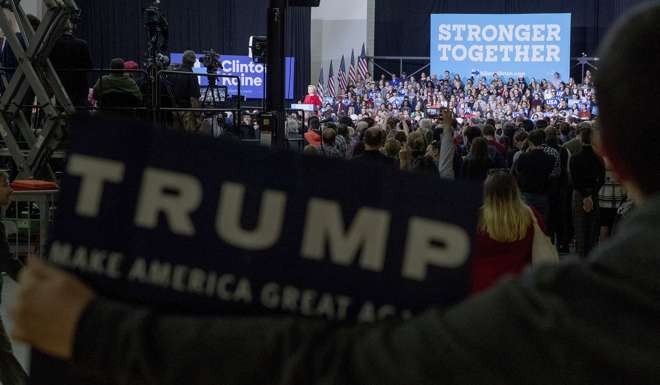
Separately, Richard Painter, who was chief White House ethics lawyer in the Bush administration from 2005 to 2007 and is now supporting Clinton, wrote in the New York Times on Sunday that he’d filed a complaint against the FBI for a possible violation of the Hatch Act.
The Clinton campaign also highlighted an open letter signed by almost 100 former federal prosecutors and high-ranking Justice Department officials from both parties that questioned Comey’s decision.
“We cannot recall a prior instance where a senior Justice Department official -- Republican or Democrat -- has, on the eve of a major election, issued a public statement where the mere disclosure of information may impact the election’s outcome, yet the official acknowledges the information to be examined may not be significant or new,” the letter said. “Director Comey’s letter is inconsistent with prevailing department policy, and it breaks with longstanding practises followed by officials of both parties during past elections.”
The Justice Department had urged Comey to abide by department policy not to do anything significant with a major investigation so close to an election if by doing so it could swing the results, according to a US official familiar with the matter.

